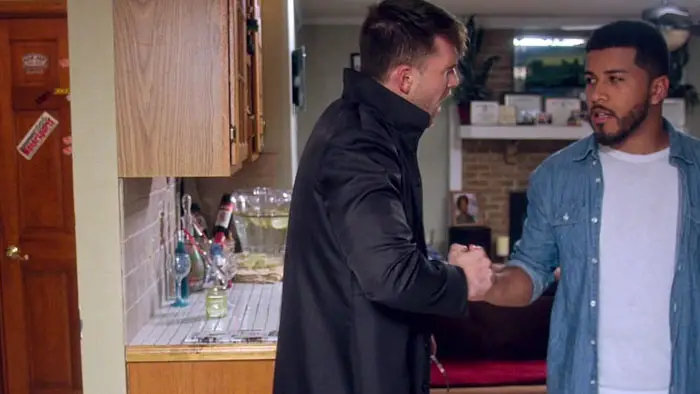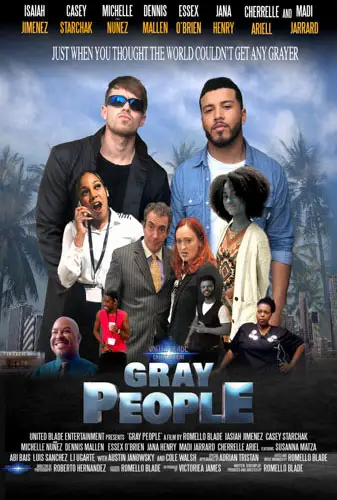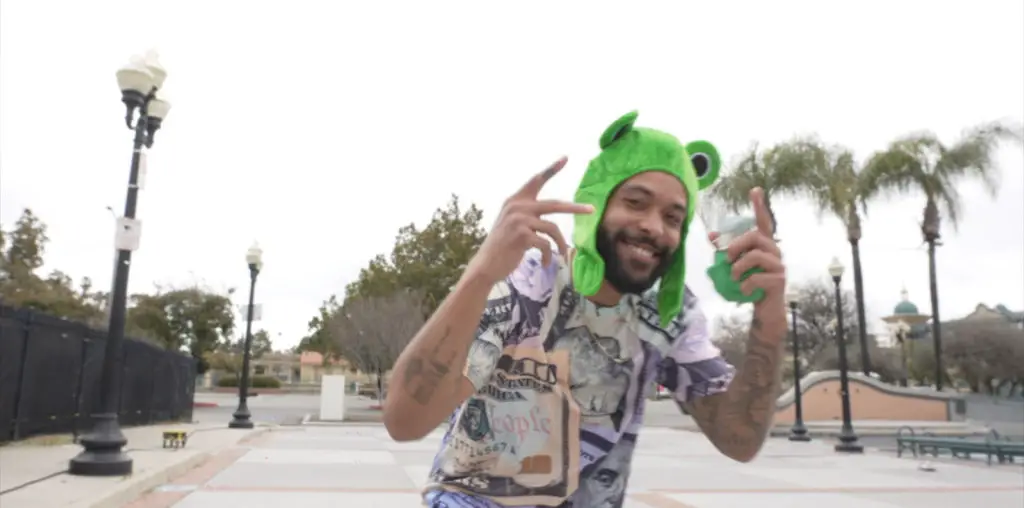
Writer/director Romello Blade’s Gray People sets up a world where a bill passes for the immigration of gray-colored people to become United States citizens. This proves to be controversial for the rest of the population. A slacker, Nick (Isaish Jimenez), has one week to move out of his mother’s house, having not paid rent in six months. His stoner friend and fellow slacker, Kyle (Casey Starchak), lives with his father. The difference between the two is Kyle lives a more privileged life thanks to his well-to-do father, Yusuf (Essex O’Brien). One of the running gags in the film is Kyle, the son of a black man, referring to himself as a person of color despite being Caucasian. The two friends have a dream of opening a medical marijuana dispensary, but all the banks in town have turned them away.
Kyle and Nick’s luck changes, however, when they come across a letter addressed to Nick’s neighbor. They find out the Goldstein Foundation is hosting a small business program for gray-colored citizens. The letter shows said neighbor has been granted acceptance into the program. They, of course, get the bright idea to paint themselves in “grayface” to join the program. Unfortunately, they don’t realize that the head of the Goldstein Foundation, Madoff (Dennis Mallen), is laundering money. At the program, the two friends meet a series of characters, including Zeka (Michelle Nuñez), another gray-colored person with a secret.

“They, of course, get the bright idea to paint themselves in ‘grayface’…”
Gray People is a picture that suffers from a lack of identity. It wants to be a stoner comedy, a social commentary on race, and a thriller involving big business corruption. Yet, it doesn’t want to settle any of them. The result makes for a confusing jumble. It is unfortunate because, at its core, there is a neat idea. The problem is that Blade lets everything go on far too long and in too many directions. The story introduces too many characters in comedic set pieces that don’t add to the narrative. For example, Nick and Kyle visit a local gray-colored stoner who gets them high. This ten-minute sequence doesn’t offer many laughs nor relate to the overall narrative. It comes off as an unnecessary detour.
In addition, the film has a two-hour running time, which makes these moments drag out the story. Nevertheless, some moments do induce a few chuckles. More problematic, however, is the commentary. It’s well-intentioned and makes its point clear, but perhaps too clear. Everything comes off heavy-handed in its approach to the gray-colored folks and in the portrayal of the side characters. Everyone comes off as stereotypes and caricatures. The core concept of the two characters changing their skin color to accomplish a goal reminded me of the controversial 1986 film Soul Man. That film dealt with a Caucasian teen posing as black to attend Harvard.
Gray People is Romello Blade’s second feature film. Despite some issues, it’s clear that he’s a filmmaker with talent and vision. It is well-produced, has some committed performances, and has its heart in the right place. It’s a film that will likely entertain but could have been a biting satire had it been edited tighter and focused on its core narrative.

"…has its heart in the right place."


